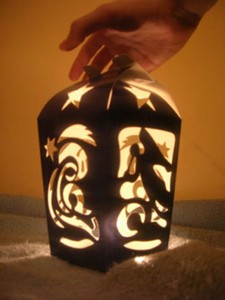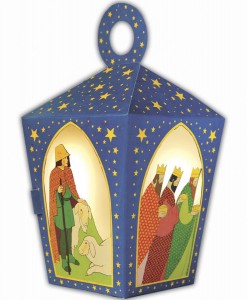

If you attend Mass during the week in Advent, try to attend at 18:00 in St Charles Borromeo parish. But arrive early so you do not miss the Rorate procession. If you have children, let them bring a lantern or a candle and take part in the procession. It is an unforgettable experience!
The Rorate Mass takes its name from the first words of the introit (the entrance song) of the Mass on the fourth Sunday in Advent: “Rorate caeli desuper, et nubes pluant justum”; “Drop down dew, ye heavens, from above, and let the clouds rain the Just One” (Isaiah 45:8). Rorate Masses are traditional in German-speaking countries, Hungary and the Czech Republic, as well as in Poland.
The Rorate Mass has been celebrated in Poland since the 13th century. A special candle was placed on the altar and lit. (Nowadays, there is often a special Marian candle lit during Rorate Masses.) The custom of lighting a special candle is said to go back to the reign of Bolesław Wstydliwy, husband of St. Kunegunda. A menorah was placed on the altar and its seven candles were lit one at a time by different members of the congregation. (To this day, sometimes you will see a menorah shining in the windows of Polish homes during Advent and the Christmas season.) In Bolesław’s parish, Bolesław lit the first candle, a cardinal lit the second, followed by a senator, a nobleman, a knight, a townsman and a peasant. As they lit the candles, each man said, “I am ready for the last judgment day.”
In Poland, the Rorate Mass traditionally begins before dawn, every day during Advent. (These days, for convenience, it is often held in the late afternoon, especially in cities.) Children walk to church through the darkness, carrying lit lanterns. The church is in darkness except for the light of candles and lanterns. The hymn Rorate caeli begins in darkness, symbolizing the darkness of the world before the Light of Christ appeared at Christmas. During the hymn, the priests and the children, carrying their lanterns, process into the church. At the end of the hymn, prayers are said and then the Gloria is sung, and during the Gloria, the lights of the church are put on. By the end of Mass, the sun is starting to rise; it is the dawn of a new day and a reminder of the True Light of Christ that will banish the darkness of sin and death.
Spiritually, Advent is the dawn. It is still not the bright light of Christmas. Advent is a time of preparation for something exceedingly joyful that is yet to come. It is a time of penance, when our souls are still struggling through the darkness, seeking the Light. There is a longing and expectancy in Advent. Our candles and lanterns at a Rorate Mass are symbols of our longing for the coming of the Savior whose light is already dawning.
Rorate caeli desuper
The Rorate Mass begins with a procession while Rorate caeli is chanted.
This plainchant breathes anticipation so that one can almost taste the coming Messiah in its text and music. The text begins with the rich and evocative images:
“The heavens sprinkle dew from above, and the clouds rain justice; let the earth be opened, and bring forth the Just One.”
The invocation of dew alludes to the blessing of Israel by the dying Moses (Dt 33:28), to numerous prophetic words about the new Jerusalem for God’s people (for instance, Zech 8:12), and the deeply intimate language of God speaking through the prophet Hosea and promising to be Himself “dew to Israel.” The chant continues with a Psalm verse. In this case, the unknown author of Rorate caeli desuper drew a clear thematic link between the verse text and the Psalm, which is “The heavens are telling the glory of God” (Ps 19:1).
Listen to the haunting hymn Rorate caeli here:
Cantor: Rorate caeli desuper, et nubes pluant justum. (Drop down dew, ye heavens, from above, and let the clouds rain the Just One.)
All: Rorate caeli desuper, et nubes pluant justum.
1. Ne irascaris Domine, ne ultra memineris iniquitatis: ecce civitas Sancti facta est deserta: Sion deserta facta est: Jerusalem desolata est: domus sanctificationis tuae et gloriae tuae, ubi laudaverunt te patres nostri.
1. Be not angry, O Lord, and remember no longer our iniquity: behold the city of Thy sanctuary is become a desert, Sion is made a desert. Jerusalem is desolate, the house of our holiness and of Thy glory, where our fathers praised Thee.
All: Rorate caeli desuper, et nubes pluant justum.
2. Peccavimus, et facti sumus tamquam immundus nos, et cecidimus quasi folium universi: et iniquitates nostrae quasi ventus abstulerunt nos: abscondisti faciem tuam a nobis, et allisisti nos in manu iniquitatis nostrae.
2. We have sinned, and we are become as one unclean, and we have all fallen as a leaf; and our iniquities, like the wind, have taken us away; Thou hast hid Thy face from us, and hast crushed us by the hand of our iniquity.
All: Rorate caeli desuper, et nubes pluant justum.
3. Vide Domine afflictionem populi tui, et mitte quem missurus es: emitte Agnum dominatorem terrae, de petra deserti ad montem filiae Sion: ut auferat ipse jugum captivitatis nostrae.
3. See, O Lord, the affliction of Thy people, and send him whom Thou hast promised to send. Send forth the Lamb, the ruler of the earth, from the rock of the desert to the mount of the daughter of Sion, that He Himself may take off the yoke of our captivity.
All: Rorate caeli desuper, et nubes pluant justum.
4. Consolamini, consolamini, popule meus: cito veniet salus tua: quare maerore consumeris, quia innovavitte dolor? Salvabo te, noli timere, ego enim sum Dominus Deus tuus, Sanctus Israel, Redemptor tuus.
4. Be comforted, be comforted, my people: your salvation comes quickly; why are you consumed with grief? Why has sorrow seized you? I will save you: fear not, for I am the Lord your God, the Holy One of Israel, your Redeemer.
All: Rorate caeli desuper, et nubes pluant justum.
When the procession and the hymn are finished, the antiphon of the day is sung. This comes from the “O Antiphons“, which are antiphons from the Breviary’s Vespers during the Octave before Christmas Eve. Each antiphon highlights a title of the Messiah. For example, this antiphon might be sung at the end of the hymn Rorate caeli:
O Radix Iesse, qui stas in signum populorum, super quem continebunt reges os suum quem gentes deprecabunter: veni ad liberandum nos, iam noli tardare.
O Root of Jesse, you stand as a sign for the peoples; before you kings shall keep silence and to you all nations shall have recourse. Come, save us, and do not delay.
Finally, there are the Rorate prayers before Mass begins:
Priest: We await the Saviour of the world,
who will glorify our mortal flesh.
So let us live sober, righteous and godly lives,
as we look forward to the coming
of the hope and glory
of our great God and Saviour,
Jesus Christ.
All: Amen.
Priest: Drop down dew, ye heavens,
from above, and let the clouds rain the Just One.
All: Earth, open, and bring forth our Savior.
Priest: Lord, hear our prayers.
All: And let our cry come to You.
Priest: Let us pray.
God, who delighted the world
through the gracious coming of Your Son,
grant us Your grace,
that our sincere penances
may help us prepare us for his coming.
All: Amen.
Priest: You will conceive and give birth to the One
who will be called the Son of the Most High.
All: God will give him the throne of David his father,
and will reign in the house of David forever.
Priest: Let us pray.
Rouse our hearts, O God,
to prepare the way of the Lord, your Son,
so that cleansed of our sins by Him,
we may serve you with pure hearts.
Through Christ our Lord.
All: Amen.

